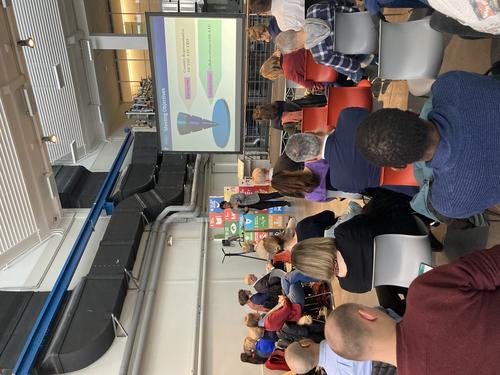BCGE Workshop: “Special focus on cooperation with Africa” and the 3rd Grand Challenge “Responsible Innovation in Times of Transformation”
On Wednesday, Mach 20th, the Berlin Center for Global Engagement of the Berlin University Alliance organised an internal workshop on “RITT - Responsible Innovation in Times of Transformation -Special focus on cooperation with Africa”. It brought together nearly 50 researchers from the four Alliance partners that engage in research with partners form Subsahara Africa. Prof. Juliet Thondhlana, the representative of the Alliance of African Universities Europe Office joined as a special guest.
Prof. Dr. Völker, Vice-President of the Technische Universität Berlin introduced BUA’s “Next Grand Challenge” that gave its title to the event, Prof. Juliet Thondhlana provided the audience with an overview of the Association of African Universities - the leading advocate for higher education institutions in Africa with currently well over 400 institutional members.
Ten eminent BUA researchers from various disciplines contributed brief snapshots of their projects and collaborations with partners from Subsahara Africa, which served as door-openers for the lively World-Café-discussions that formed the core of the event, for example:
Recurring themes were funding and equal funding distribution but, also advocacy and technical issues like a welcome culture and visa facilitation.
Workshops that permit for joint proposal development would be highly valuable, summer schools and online courses could be supportive.
In a number of African countries, structures for entrepreneurship are well developed, but
market uptake can be challenging.
The need was highlighted for developing approaches on how co-operation in instable or
from a European perspective otherwise difficult contexts could or should be designed.
How can scientists be sensitised, protected and how can an understanding be developed of
the distinct role scientists have in their respective societies?
A debate ensued on how to reach sustainability of research co-operations and on the need for enabling cooperations that go beyond the networks of individual scientists. How can the mutual trust be maintained?
Possibly sharing infrastructures and other resources might become an option.
The Berlin University Alliance was seen as a potentially powerful partner for bringing a wider array of researchers together, for providing access to other networks, for supporting the sustainability of cooperations, and for providing weight in the international arena.
The meeting closed with Dr. Angelika Wilhelm-Rechmann highlighting recent international developments and providing an outlook with special reference to the AU-EU Innovation Agenda. Prof. Juliet Thondhlana and Dr. Herbert Grieshop, Head of International Affairs at FU Berlin and Speaker of the BUA Steering-Committee “Internationalization”, highlighted in the concluding discussion the potential that could lie in future and further cooperation between the Berlin University Alliance and the Association of Africa Universities.

